Impact Report


A message from







At the beginning of the COVID-19 pandemic, we had to shut our doors, like much of the rest of the world. Though our librarians and staff did an excellent job continuing to provide services, resources, and support to students and faculty during that strange time, we couldn’t wait to reopen. The going was slow, with capacity limitations and social distancing to keep people safe, but people did start to trickle back into our facilities. More than a year later, I am happy to report that Clemson Libraries is now seeing usage back at pre-pandemic levels, and nothing makes a librarian happier than seeing a full library.
What did we learn from the pandemic? Well, while providing information is pivotal to supporting the University, what matters most is the personal interactions that take place — between students, between researchers, between library employees and those we serve. Libraries have become gathering places where what is learned in the classroom can be applied, where ideas can be tested. We see this every day in the Adobe Studio and Makerspace, where students use software to create images, videos and podcasts, or 3D printers to mockup and share their ideas. We see it in our own classrooms as students work with librarians to find information and integrate it with their own thinking to solve real-world problems. The information and services, physical and virtual, provide a catalyst for discovery. We’re proud to be able to see this firsthand again.
This impact report highlights some of our accomplishments from 2021-2022, as well as provides data Illustrating the increasing use of our facilities, resources, and services. I am incredibly proud of the outstanding work the incredible experts at the Libraries have accomplished. For us, as with Clemson, “best is the standard.” We strive to provide the best possible service to our students, faculty, staff, and community patrons each and every day. I truly believe that the best is yet to come and can’t wait to share what comes next.

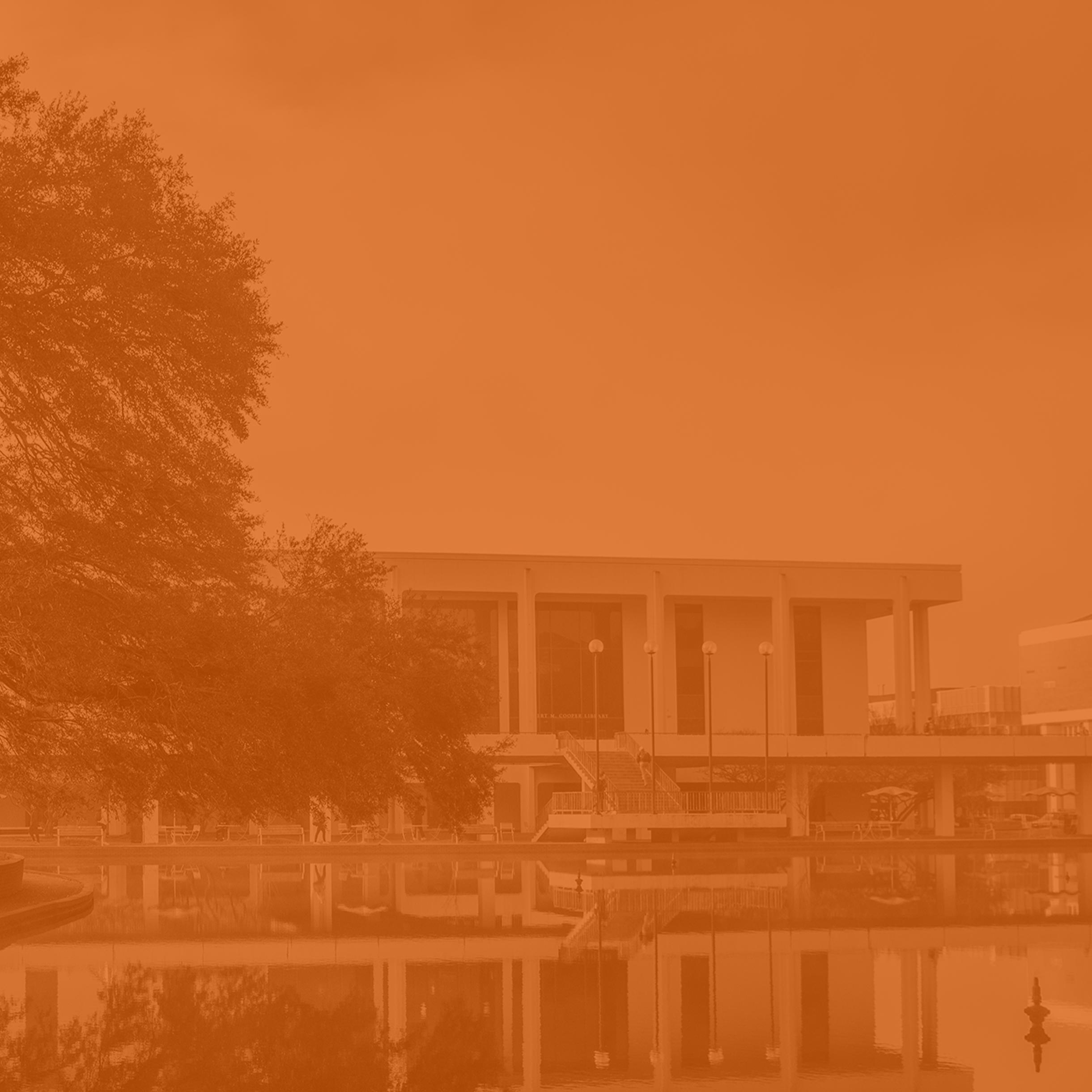 Chris Cox, Dean of Libraries
Chris Cox, Dean of Libraries
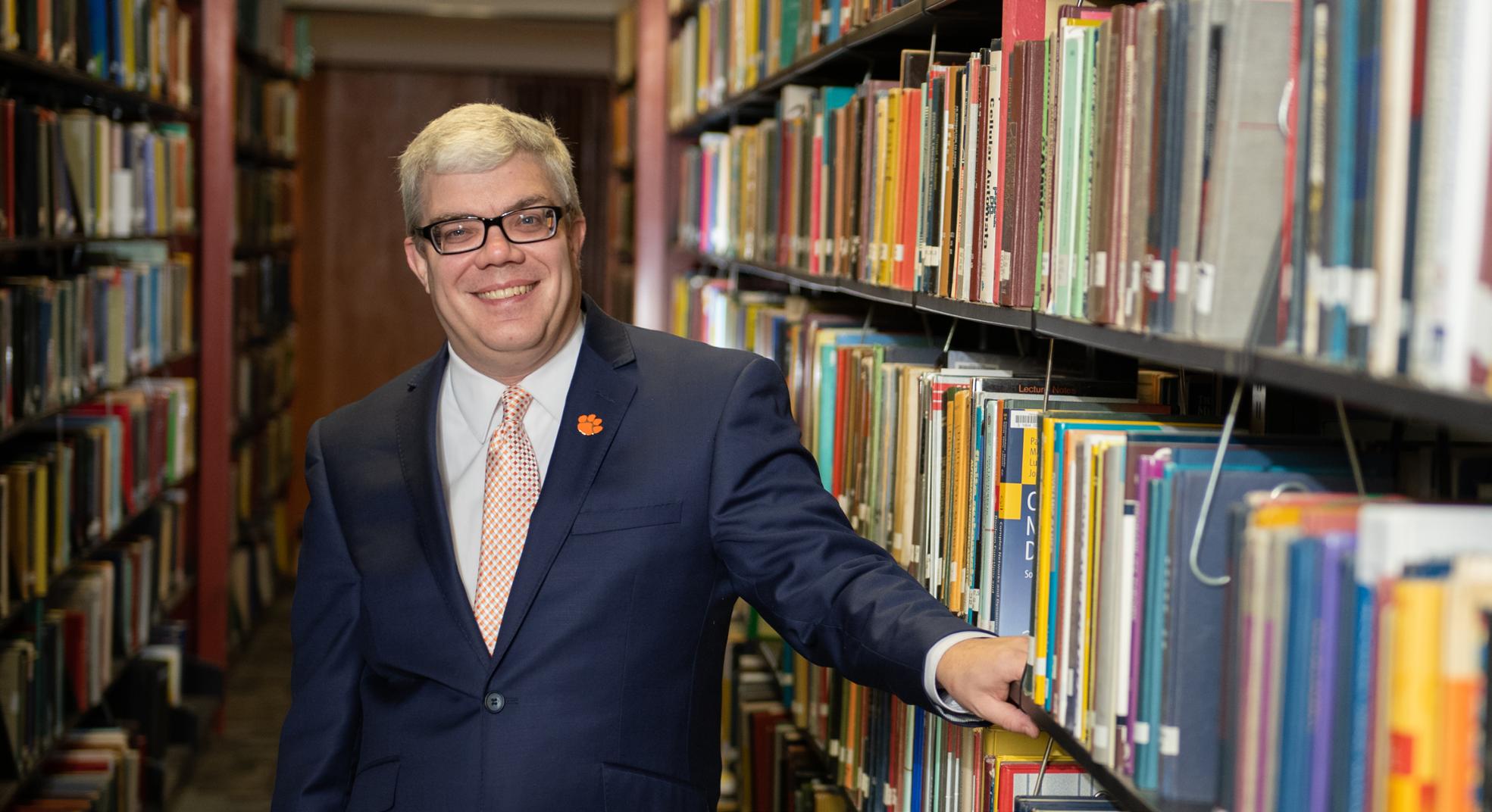
MissionClemson Libraries provide innovative and inclusive collections, programs, services, and technologies that support Clemson University goals and the information needs of all.
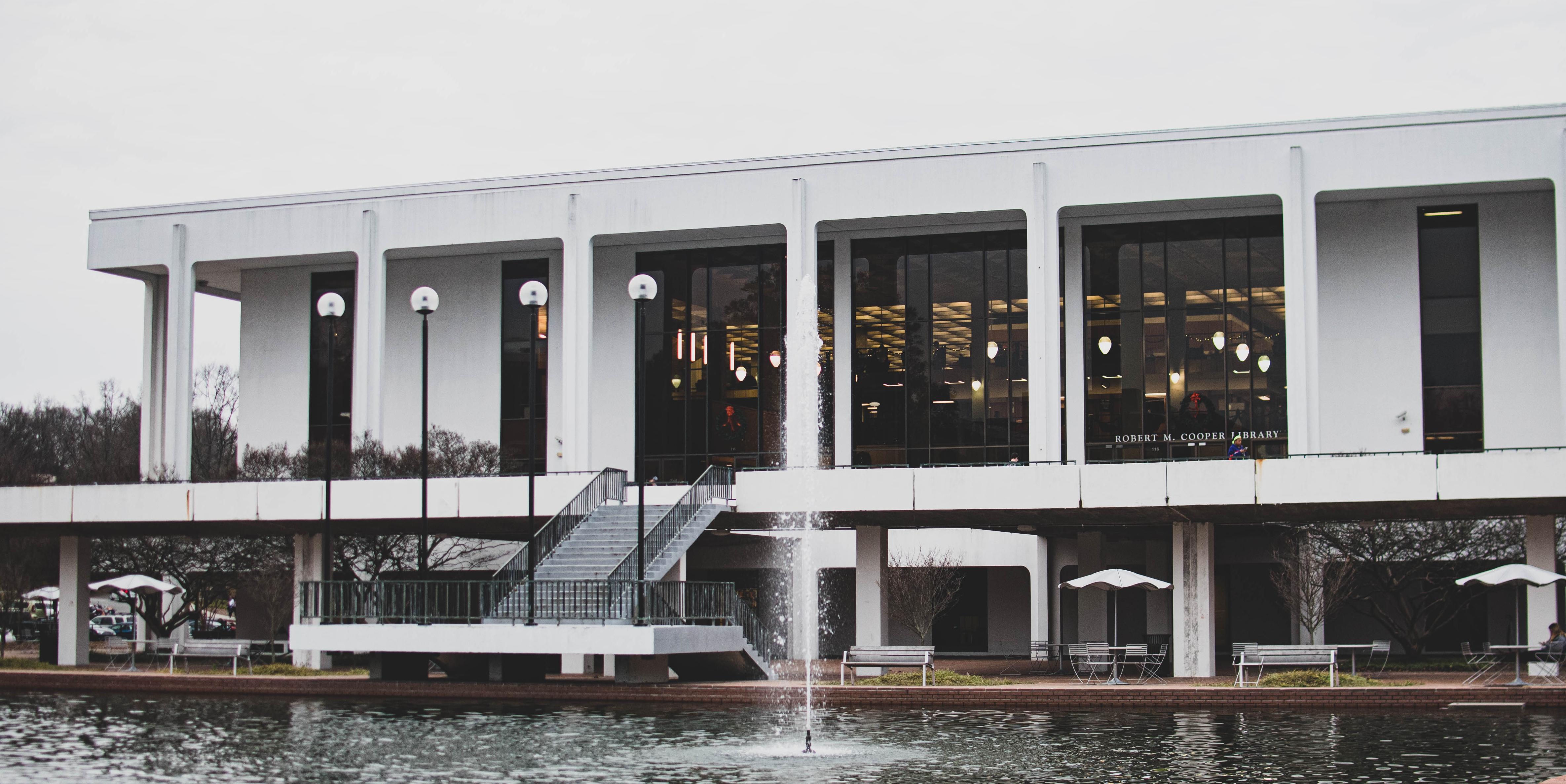
Clemson Libraries will be a leader in campus-wide, local, multi-institutional, regional, and national collaboration to fully serve the community.
These are the values that guide decisions at Clemson Libraries:
Collaboration - Work together across the Libraries, the University, and beyond to better serve all users.
Inclusion - Provide an environment that is welcoming, accessible, values the lived experiences of all users and personnel, and seeks to disrupt oppressive systems and culture.
Innovation - Accept new challenges and adopt new technologies and service models in order to create solutions and ideas that meet the current and future needs of all users.
Community - Continuously seek to align all services, programs, spaces, and collections with the needs of all communities with care and fostering a sense of belonging.





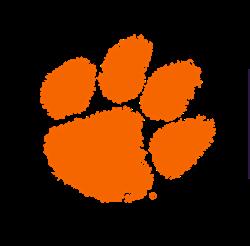
• Cooper Library: 874,769
• Gunnin Architecture Library: 35,559 • Education Media Center: 12,638 • Charleston Design Center: 3,570

The official publisher of scholarly work created at Clemson, Clemson University Press, is now part of the Association of University Presses, a distinguished international community of publishers committed to the highest caliber of research-based scholarship.
“Members of the Association of University Presses are expected to meet high standards of both professional publishing and editorial rigor. Our community of scholarly publishers is dedicated, knowledgeable, and generous and we are so pleased to welcome Clemson University Press and its staff into that community,” said Peter Berkery, executive director of AUPresses.
Director of CUP John Morgenstern echoed Berkery’s sentiment and said membership in AUPresses will help solidify Clemson’s position as one of the leading research institutions in the nation.

“Membership in this global community of publishers recognizes the quality and significance of the Press’s work in shaping scholarly fields and in publishing reliable information that promotes new ways of thinking and enriches lives,” said Morgenstern. Dean of Libraries Christopher Cox said being accepted into AUPresses has been on CUP’s list for years and is one of the reasons the University Press moved to the Libraries from the English Department.
University presses are publishers. At the most basic level that means they perform the same tasks as any other publisher: acquiring, developing, designing, producing, marketing and selling books and journals, just like Random House or Sage. But while commercial publishers focus on making money by publishing for popular audiences, the university press’s mission is to publish work of scholarly, intellectual, or creative merit, often for a small audience of specialists or a regional community of interest.
“The mission of Clemson University Press is to publish trusted, high-quality scholarship and to promote Clemson as a center of learning and culture throughout the world,” said Morgenstern.
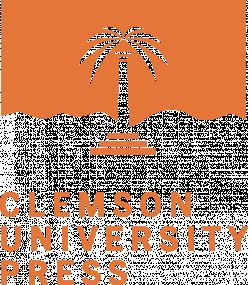
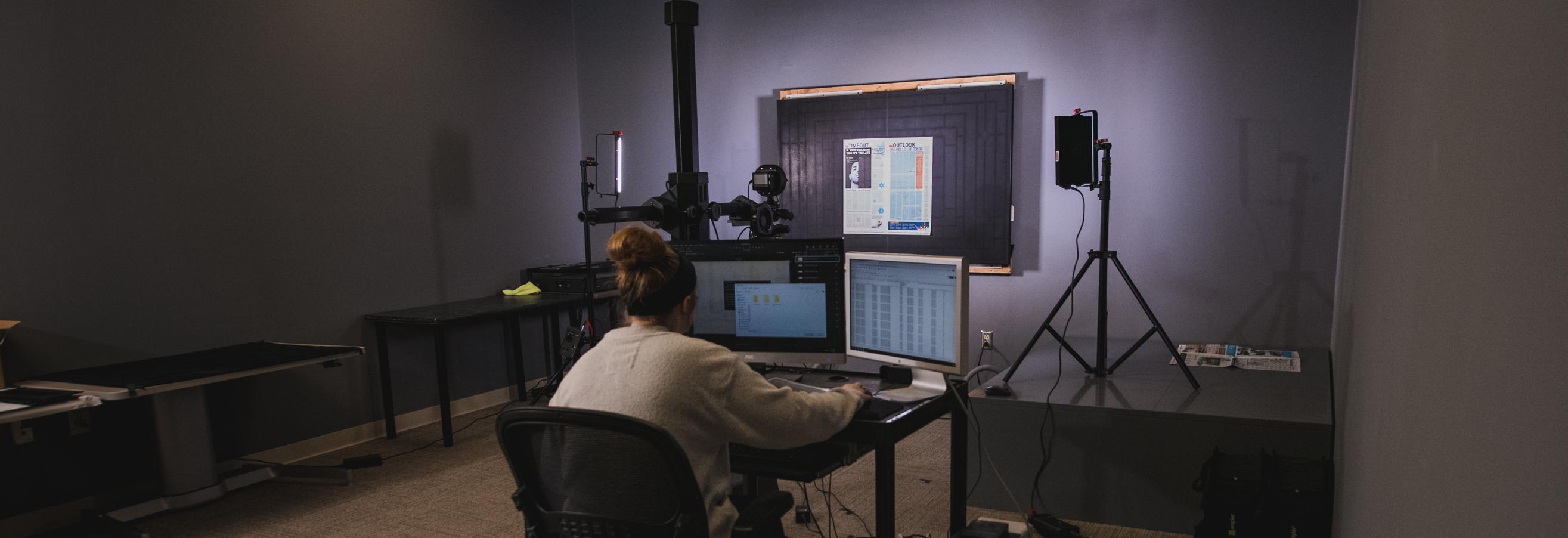
Morgenstern noted the Press has expanded in recent years, publishing approximately 30 books per annum as well as a growing list of scholarly journals in the arts and in Extensionrelated fields.
Less is sometimes more, at least that seems to be the case when it comes to technology. In 2021, Clemson Libraries reduced the number of public-use computers in Cooper Library from 100 down to 15. Students prefer to bring and work on their own devices, so getting rid of unused computers opens up more space for students to collaborate and study. If they need a bigger screen, students can connect to one of four laptop hoteling stations on the fourth floor of Cooper, a new addition in 2022. There are also seven new hoteling stations available for Libraries employees at Cooper Library and the off-campus depot, making it easier for employees to attend meetings and work at different Libraries locations.
All printers in the Libraries were changed to CCIT’s new PaperCut print release program, allowing students to print to the Libraries printers from anywhere. Print jobs are only printed when students release the job via a touchscreen at each printer, which means that unclaimed print jobs are never printed, saving paper and reducing waste.
The technology lending program added several new items over the course of the year, including:
• 4 Canon M50 mirrorless cameras
• Canon T8i DSLR
• Fotodiox light kit
• Canon Speedlite 430EX RT-III Flash
• 2 Ricoh Theta SC2 360 cameras
• 2 Sony AX100 camcorders
The advanced manufacturing industry is continuously evolving thanks to technological innovations, increasing the need for a skilled workforce. To ensure educational institutions in South Carolina can help meet the industry’s growing employee demand, Clemson University, Trident Technical Community College and Claflin University are working together on a new project to provide access to affordable learning resources. The project received a $759,629 grant from the U.S. Department of Education in its first year.
The project, titled the Collaborative Development of Robotics Education and Advanced Manufacturing Open Educational Resources (Co-DREAM OER), aims to dramatically lower the cost of learning for students in advanced manufacturing through the development of three openly licensed textbooks and digital ancillary materials on robotics. The textbooks are expected to save students at the three institutions a total of $150,000 annually and will also be available to institutions across the country.
Robotics education historically lacks suitable low-cost books for use in associate, undergraduate and graduate courses. Existing textbooks cost between $150-200, which is often out of reach for many students, particularly those on financial aid. They also typically focus on theory, resulting in abstract learnings that are not always aligned with industry needs, especially for those in associate programs.
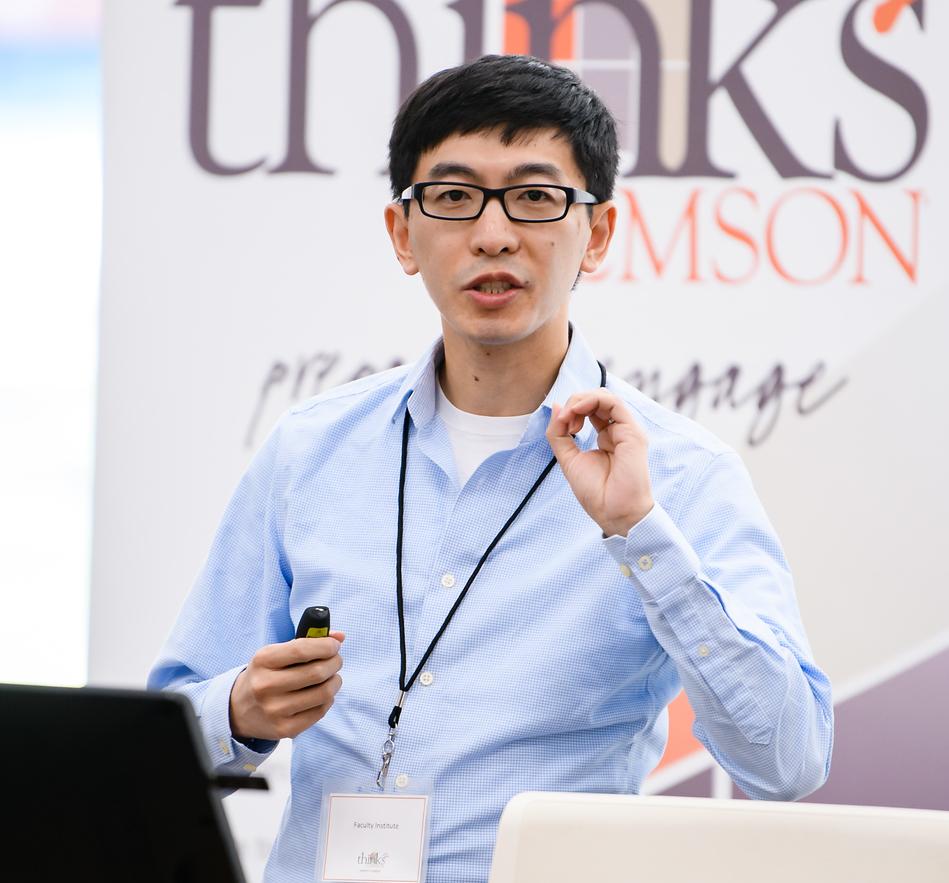
The free textbooks produced by Co-DREAM OER are an innovative solution to these obstacles and will include supplementary materials and simulation technology, allowing higher education institutions to create courses and programs to better prepare students. Designed based on Universal Design for Learning principles and educational research on students from a variety of backgrounds, the textbooks also aim to address the
learning needs of diverse learners and increase participation in robotics education by under-represented students.
Of the three books, one will be designed for two-year associate programs, another for four-year bachelor’s programs and the third for the master’s track. The baccalaureate book will be available early 2023. Clemson is one of nine institutions to receive the 2021 grant. The project is also supported by industry partners such as BMW and ABB Robotics, the South Carolina Department of Commerce, as well as the Partnership Among South Carolina Academic Libraries, the state’s academic library consortium.

The three books to be produced by Co-DREAM OER are only the start of a larger initiative by the partner institutions to develop textbooks to support advanced manufacturing education. The project seeks to develop six additional textbooks, three in mechatronics and three in advanced manufacturing for associate, bachelor’s and master’s degree programs.
Open Resources Librarian Yang Wu was selected to participate in the Scholarly Publishing and Academic Resources Coalition (SPARC) Open Education Leadership program to further advance open education efforts at Clemson University. The program includes an online course, the opportunity to be paired with an experienced mentor, and a capstone project.
A new partnership with South Carolina State Parks has made is easier for Clemson students, faculty and staff easier to explore the natural beauty of the Palmetto State. State Park Passports are now available to check out at Cooper Library and are good for free entry to any of South Carolina’s 47 state parks.
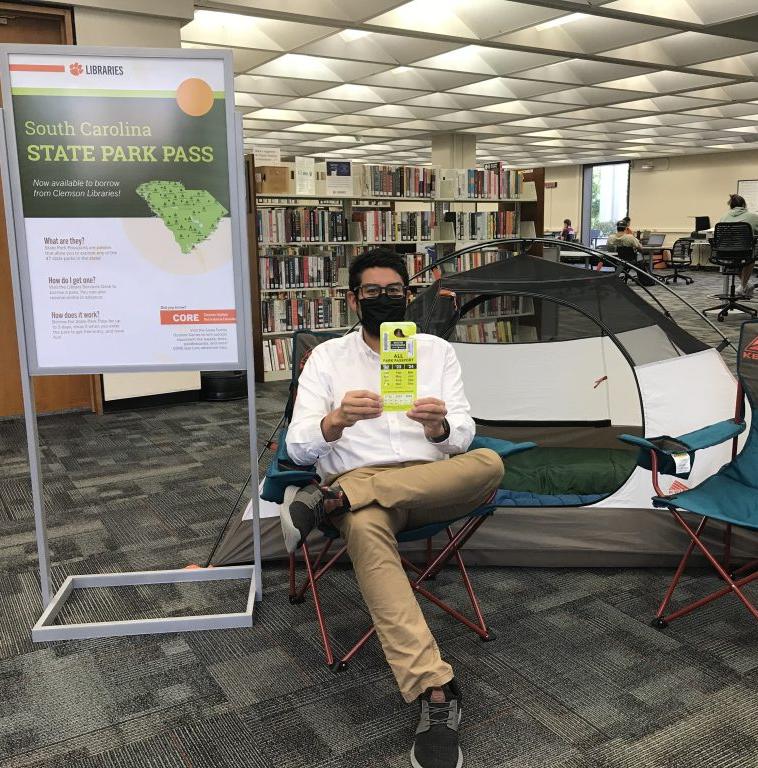
Twenty-five passes are available, and passes can be checked out for three days at a time.
During the first year of the program, passes were checked out 240 times by 162 different patrons across 39 majors and 31 departments. The most popular destinations were Table Rock State Park and Devil’s Fork State Park.
Research, innovation and creativity define the Clemson University experience, and the partnerships with like-minded individuals, companies and corporations enhance those experiences.

Since 2014, Clemson has partnered with Adobe in a variety of ways with the most impactful example of this pairing coming in the form of the Adobe Digital Studio at the R.M. Cooper Library on campus. This creative, collaborative space has served as a hub of ingenuity for Clemson students, faculty and staff for more than five years, and it will now continue for the next five years and, perhaps, beyond.
Working closely with Clemson University’s External Affairs’ Office of Corporate Sponsorships and Strategic Initiative and the Development and Alumni Relations division, the University and Adobe announced that Adobe will continue to hold naming rights to the Adobe Digital Studio through 2025. This means significant upgrades to equipment, furniture and the layout of the Digital Studio to go along with continued access to Creative Cloud for all the University’s students, faculty and staff.
According to Kelsey Sheaffer, director of the Adobe Digital Studio, this new Adobe investment will be the beginning of an even more collaborative space and create an environment where what students build in an Adobe program can be brought to life almost immediately.
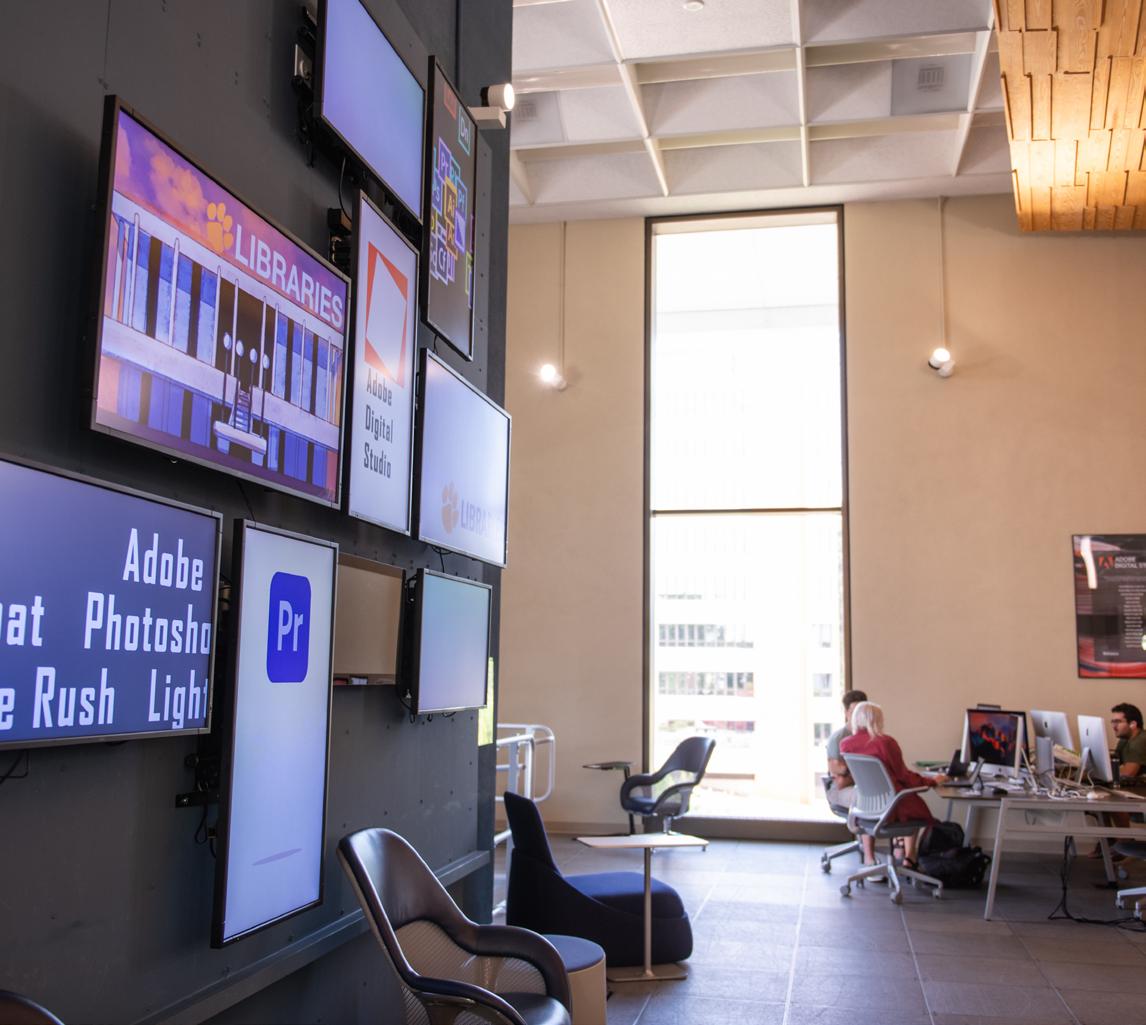
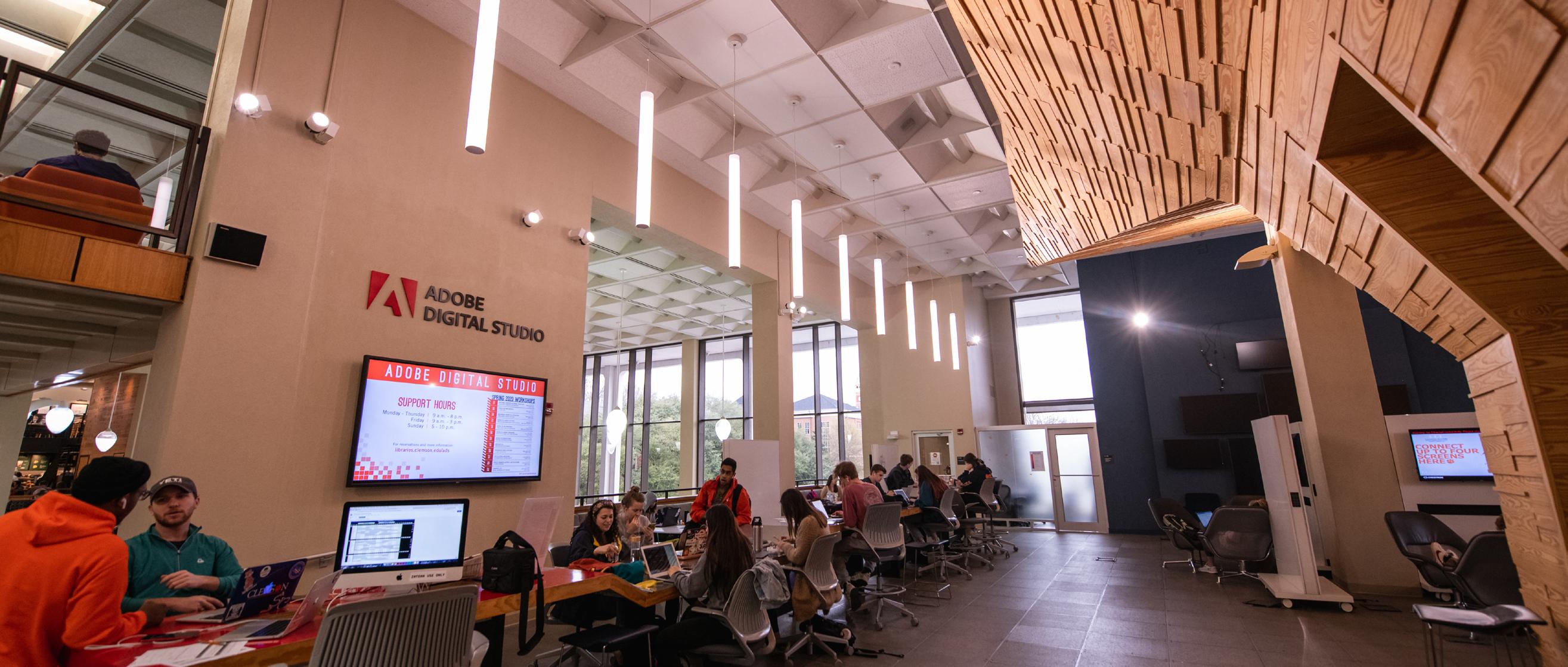
Upgrades to the Adobe Studio include moving the Cooper Makerspace inside the studio and installing a glass will with a door for enhanced security for the area. Other upgrades will be made in the following areas:
lab for augmented and virtual reality


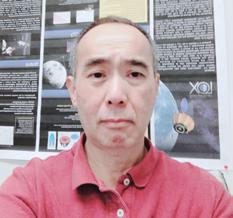

Data visualization has a new home in the R.M. Cooper Library – the Scholars’ Lab. Located on the fourth floor of the library, in room 413, the new space includes a variety of resources to help students, faculty and staff work with data to present it in a graphical format.
The lab features hardware, such as a 3D modeling table and large presentation screens, and data visualization software, such as Tableau, Python and R Studio, but what truly sets it apart from other resources on campus is the expertise of its faculty and graduate students, who are available to assist users of any skill level with their data projects.
“Data visualization is a key skill that a lot of companies are looking for in employees now,” said Megan Sheffield, data services librarian and director of the Scholars’ Lab. “Students learn how to conduct research and write a paper, but they also

need to learn how to create dashboards and other ways to display their data. It is an important communication skill that falls under the umbrella of digital literacy, and we are trying to help fill that gap.”
The lab also hosts workshops and other events designed to teach people about data visualization. Sheffield also assists faculty with data management plans for grants and can help find an archival home for research data once a project is completed.
The Scholars’ Lab officially opened in January 2022. During its first six months, it hosted 18 events, workshops or lectures with a total of 256 participants.

Faculty who implement Open Educational Resources (OER) into their classrooms can receive support from Clemson Libraries through the OER Faculty Award program. OER are instructional materials, such as textbooks and homework systems, that are openly licensed, free to use and allow unlimited distribution and modification.



Faculty members who integrate OER into their courses or keep learning material costs below $35 by using low-cost resources can apply to receive the awards, which range from $1,000 to $1,500 per semester. Awards are given based on projected student savings and the number of students affected.

Clemson Libraries has established a new award to celebrate and recognize undergraduate student research. The award recognizes students who make use of library resources and services to produce outstanding research or scholarly or creative works.
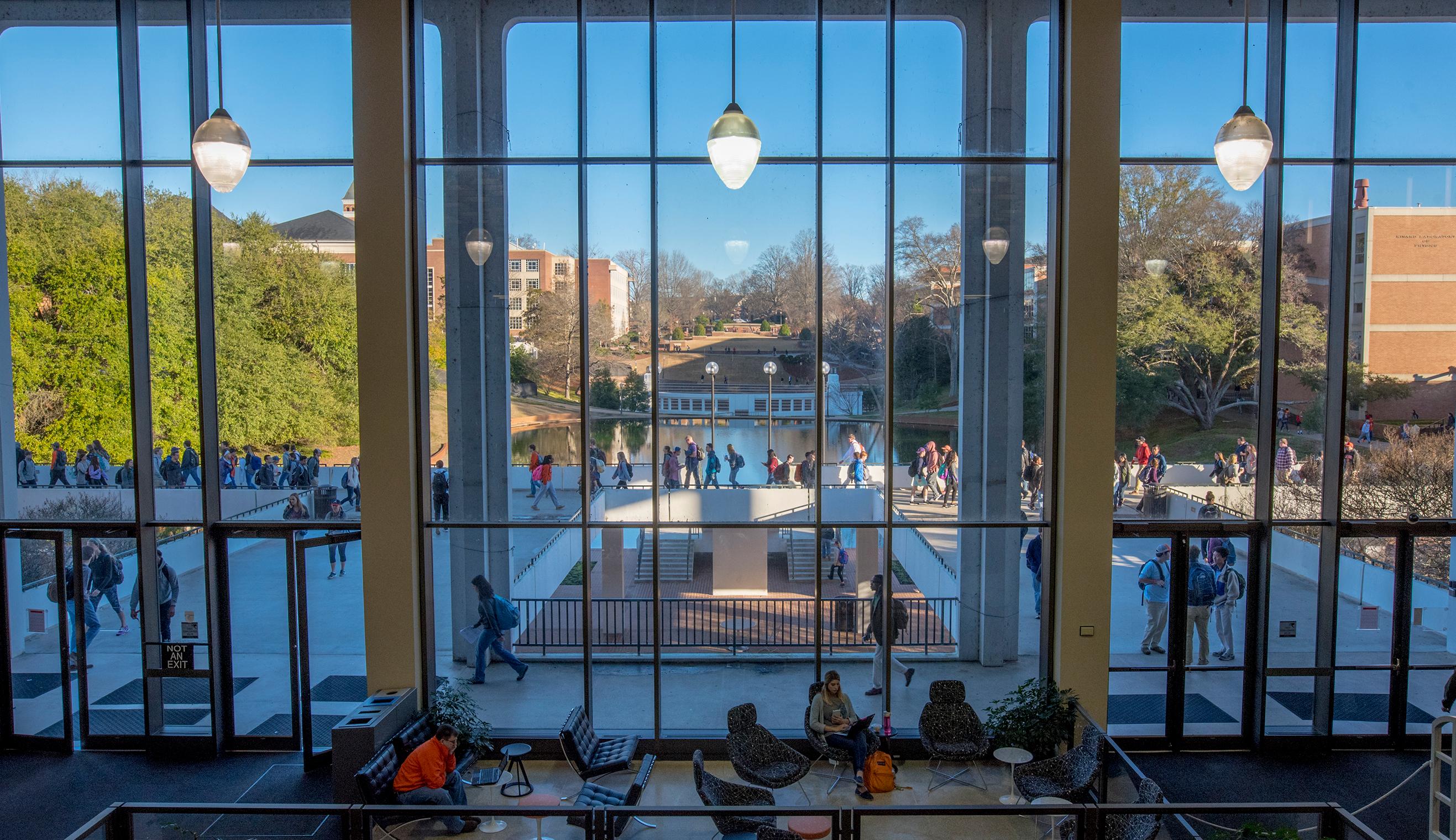
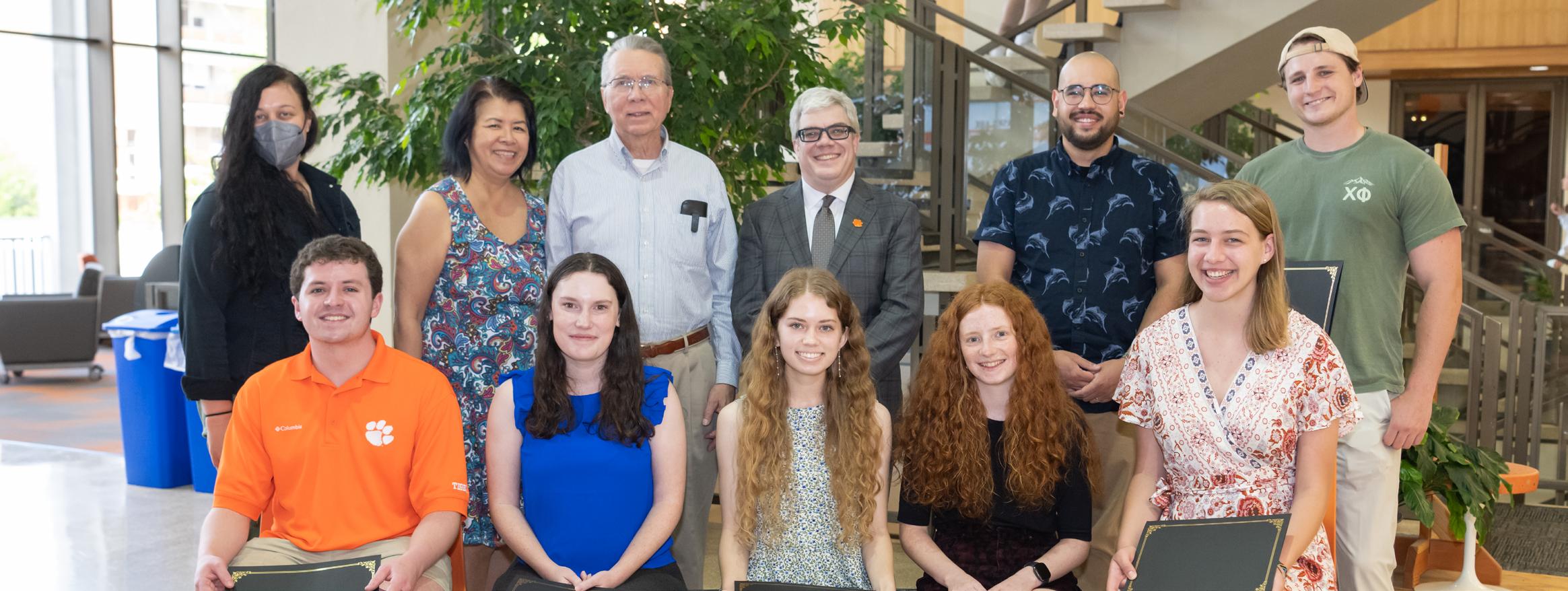
English major Makenzie Anderson and pre-business major Julia Teets are the inaugural first-place recipients of the Clemson Libraries Undergraduate Student Research Award for their project titled “Stereotypes of the ‘Good’ vs. ‘Evil’ Witch: A Counter Narrative to the Poisoned Apple.” The project was a screenplay looking at the portrayal of witches in the media and stereotypes associated with them. They used the libraries’ online resources to search databases for peer-reviewed articles and books on the topic and to validate their sources. Both Anderson and Teets are students in the Clemson Honors College. Briana Pocratsky, lecturer in the department of sociology, anthropology and criminal justice and faculty-in-residence for the Honors College, was the faculty mentor on the project.
The second-place winners were Allison DeLoache, a biological sciences major, and Carter Balach and Conor Joye, both wildlife and fisheries biology majors, for their project “Effects of Trout Stocking on Aquatic Insect Abundance in Western North Carolina Streams,” which was mentored by Catherine Jachowski, assistant professor in the department of forestry and environmental conservation.
Third place went to Honors College student Faith Shupard and Leah Stokes, both animal and veterinary sciences majors, for their project “Are Laying Hens a Suitable Translational Research Model for Osteoporosis in Humans?” Their faculty mentor was Jeryl Jones, professor of animal and veterinary sciences.
Both the second- and third-place winners were projects in Creative Inquiry, Clemson’s cross-disciplinary undergraduate research program.
The first-place winners received an award of $1,000, with $750 going to second place and $500 going to third place. The recipients’ research papers will be made available in TigerPrints, Clemson’s digital repository.

Clemson Libraries now offers Clemson researchers the option to publish their research as open access at no cost to them through a partnership with the Carolina Consortium and Wiley publishing company.
The Wiley Read and Publish deal provides subscription access to nearly 1,500 journals as well as a shared pool of vouchers for open access publishing. Clemson is one of 40 consortium members participating in this deal this year.
Open access articles and publications are freely available for the public to read, download and share. Normally authors must pay an article publication charge, but the deal covers that cost for up to 700 researchers from Carolina Consortium member schools.
Clemson has a similar agreement through the Carolina Consortium with Cambridge University Press, which allows faculty to publish open access articles at no cost in gold and hybrid journals.
Clemson University Dean of Libraries Chris Cox has been named president of the Associational of Southeastern Research Libraries (ASERL), one of the largest regional research library consortia in the United States.

ASERL has 38 member libraries across an 12-state region, spanning from Maryland to Louisiana. It brings together leaders from research, federal and state libraries to foster collaboration and resource sharing across institutions.
Over the next year, the ASERL Board of Directors will begin a new series of focus groups with its members to solicit input on future programming directions, an idea first raised by Cox, said ASERL Executive Director John Burger.
“Chris will be the first ASERL president from Clemson in more than 20 years,” said Burger. “He’s provided tremendous leadership for us in other roles relating to our highly regarded diversity, equity, and inclusion activities. I’m really looking forward to working more closely with Chris as we explore new ways ASERL libraries can further collaborate into the future.”
Cox has served at Clemson since 2018. Prior to coming to Clemson, he served as dean of library services at the University of Northern Iowa. He was previously dean of libraries at Western Washington University and served as assistant director of libraries at the University of Wisconsin – Eau Claire. He earned a bachelor’s degree in English from Susquehanna University, a master’s in English from the University of Connecticut and a Master of Library and Information Science at the State University of New York at Albany. He is currently working towards earning his Ph.D. in educational leadership from Clemson.
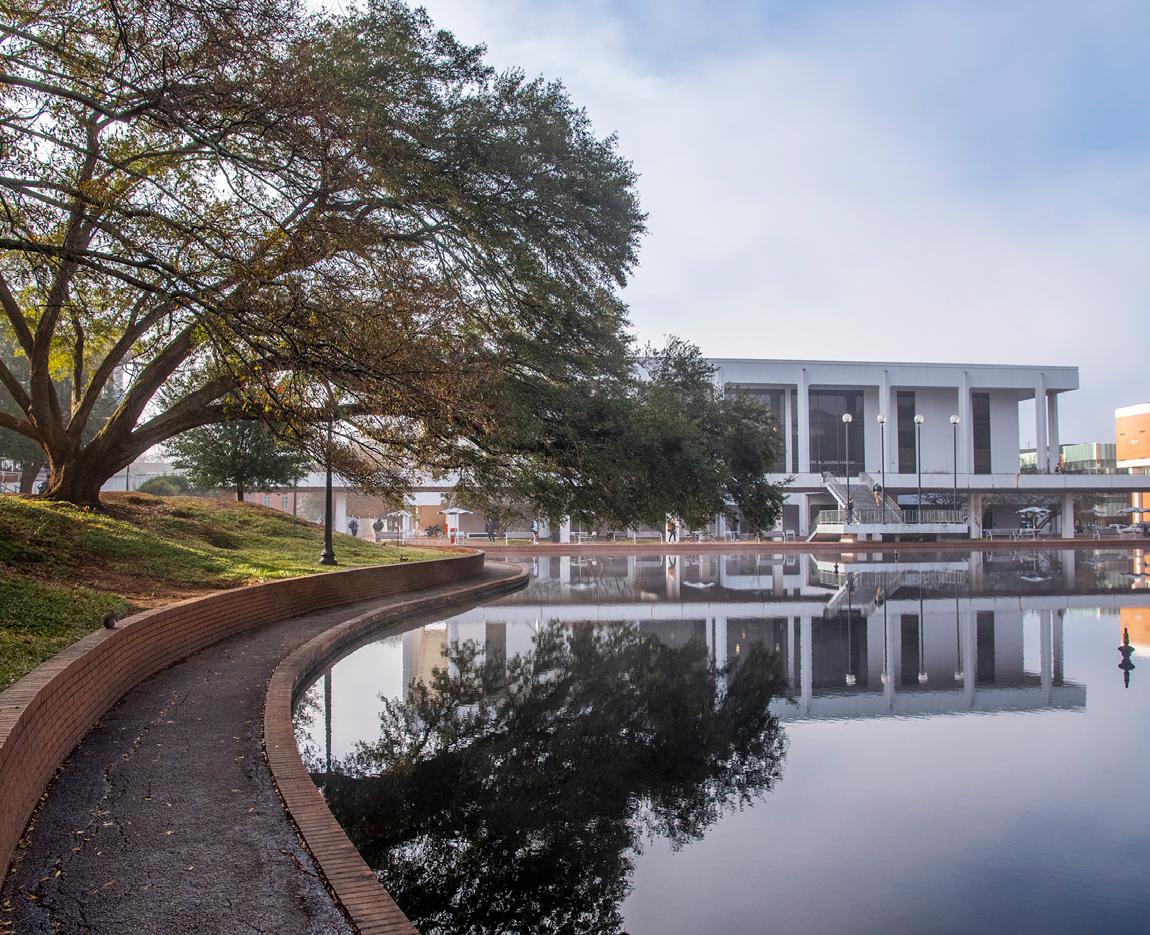
Clemson University Libraries seeks to best serve our community through creating a welcoming environment in which diverse ideas and perspectives come together to achieve common goals. We are committed to the practice of inclusion as it is essential to the continued success not only of Clemson University but of the library and information science profession. We embrace Clemson’s core values of integrity, honesty, and respect, and add to those the ideals of compassion, dignity, and historical awareness so that Clemson Libraries’ staff, collections, spaces, and services inform the interest, information, and enlightenment of all who we serve.
Clemson Libraries supported a variety of EDI-related initiatives this year by raising awareness through special resource guides, books displays, events and more.
Examples include:
• Hispanic and Latinx Heritage Month online resource guide and book display
• International Day of Persons with Disabilities online resource guide
• Martin Luther King Jr. Day online resource guide
• Black History Month book display
• Chinese New Year online resource guide and virtual book display
• Book talk on the African-American experience at Clemson and the University of South Carolina
• Open for Anti-Racism webinar
• Discover Your Ancestors Black History Month event
• Black History Month trivia night
• Picture a Scientist film for Women’s History Month
• International Women’s Day virtual book display
• LGBTQIA+ Pride Living Library Event
• Drag Queen Story Hour
• Asian American Pacific Islander Heritage Month
• Celebrating Asian Americans in Academic Libraries webinar
• Black Librarian in America book talk
• Juneteenth virtual book display
“I look forward to working with my colleagues at the ASERL Libraries, both virtually and again in person, to provide better library services to those we serve and be a leader within the profession... It’s been almost two years since we have been able to gather together. I see this year as one of rebuilding community with a specific focus on inclusion.”
116 Sigma Drive Clemson, SC 29634 - 3001 864.656.0229 www.clemson.edu/library
